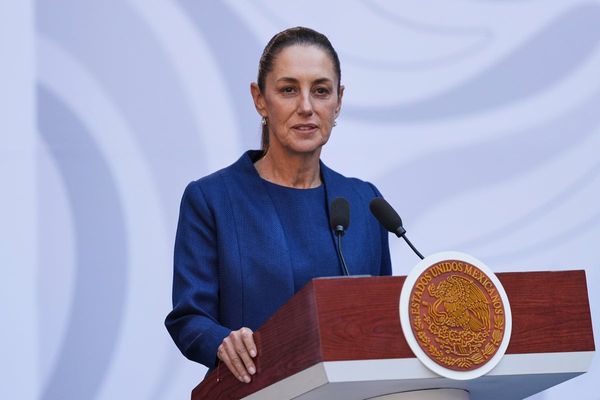
Harun’s nightmare began with a fever, a general sense of being under the weather. Maybe it was Covid, he thought. Then his temperature soared to over 40C, and his muscle aches soon became unbearable. A pimple appeared on his nose, and swiftly spread across his face. He called an ambulance half a dozen times, but none arrived. As his throat became covered in lesions, he could no longer swallow food. It was then he was finally admitted to hospital, and spent 11 days there in agonising pain.
Harun had been infected with mpox – formerly known as monkeypox. There have been more than 3,500 confirmed cases in the UK since last spring, but here’s a crucial detail: it was overwhelmingly men who have sex with men who were affected. An emerging infectious disease, affecting a historically marginalised community, in a Covid-weary media environment – the response to mpox could have been a disaster. Thanks to the government, it very nearly was. But mpox was contained in the UK because of the work of queer campaigners determined not to let a public health crisis or moral panic erupt.
Early on, even discussing the fact of who was most affected by mpox was controversial. Social media abounded with furious claims that it was homophobic to state the truth: and indeed it was reasonable to ask how a virus could possibly know and target the sexual orientation of its host. It cannot, of course: mpox is hard to transmit and tends to do so through the protracted physical contact involved during sex.
This speaks to a reality some queer men are uncomfortable publicly discussing. Gay and bi men are particularly negatively associated with promiscuity, and a defensive response is to dismiss this as lazy stereotyping. While it is true, of course, that some gay and bi men exhibit sexual behaviour not dissimilar to their straight counterparts, they are overall more likely to have a higher number of sexual partners and to be in open relationships. The correct response here is to defend sexual freedom, but acknowledge the risks.
Indeed, a wrong-headed strategy offered up by the so-called LGB Alliance – an organisation set up to oppose established mainstream LGBTQ+ campaign groups such as Stonewall over its stance on trans issues – was that saunas and fetish bars should be temporarily closed. This horrified sexual health experts, who pointed out that the clientele would simply have sex elsewhere but be harder to reach with messaging about mpox.
Another response was to hype up panic, with some social media accounts that came to prominence during the Covid crisis encouraging the idea that mpox would become a new pandemic which would rip through the population. Indeed, it fell to queer activists educated by the trauma of HIV and Aids to stabilise the situation, and fill a vacuum left by government failure.
One non-profit organisation that played a key role in dealing with the outbreak was the Love Tank, cofounded by public health academic Will Nutland. He says there were individuals and teams within the government and arms-length bodies which did “exceptionally well”. But two Tory policies played a pernicious role in undermining the response: 13 years of slash-and-burn cuts, and the deliberate fragmentation of the NHS.
Public-health budgets have suffered cuts of £1bn under Conservative rule, leading to a 17% cut in sexual-health services since 2015. As the mpox outbreak began, people were turning up to sexual-health clinics with symptoms such as anal and genital lesions which they believed were caused by sexually transmitted infections. But these overburdened and underfunded services were not resourced to test for mpox.
The problem, Nutland says, “was that there was no single overarching person or department responsible for bringing all the bodies and parties together, leaving a rudderless ship”. This is a legacy of the 2012 Health and Social Care Act, a piece of legislation three times longer than the bill that founded the NHS in 1948, and which fractured the service. Public health was devolved to England’s local authorities, which suffered cuts in non-education spending per resident of almost a quarter in real terms in the first decade of Tory rule.
Last summer, Nutland found himself in about a dozen mpox meetings each week, lacking information about when vaccines were available, how they were procured, how much was needed. The Love Tank stepped up, particularly targeting marginalised, at-risk communities such as queer men of colour, but their efforts were held back by chaos at the top. When they arranged to vaccinate revellers at UK Black Pride, it was “by the skin of our teeth” that doses arrived at all, says Nutland.
He says that the government expected charity workers to provide help with no initial remuneration. Basic tasks were turned into insurmountable challenges: after multiple meetings about posters to raise mpox awareness went round in circles with no resolution, the Love Tank printed them themselves. “It probably cost us 20 times as much in staff time to work out how to get the posters printed as getting them printed at all,” says Nutland. And while for weeks sexual health clinics had no vaccines, when the doses finally arrived there wasn’t enough money to employ people to to inject them into the arms of the at-risk.
As the vaccination programme stepped up, the numbers of mpox cases plummeted. Unlike Covid, mass death did not result. Instead, significant numbers of mostly queer men were infected with an often deeply unpleasant illness. Yet a toxic cocktail of cuts and ideologically driven fragmentation undermined a response which could have been so much more efficient and simple.
Thanks to the determination of queer campaigners, this public health crisis was overcome – at least, for now. But the lesson is clear: with our health services hobbled, we may not be so fortunate next time.
Owen Jones is a Guardian columnist
Do you have an opinion on the issues raised in this article? If you would like to submit a response of up to 300 words by email to be considered for publication in our letters section, please click here







